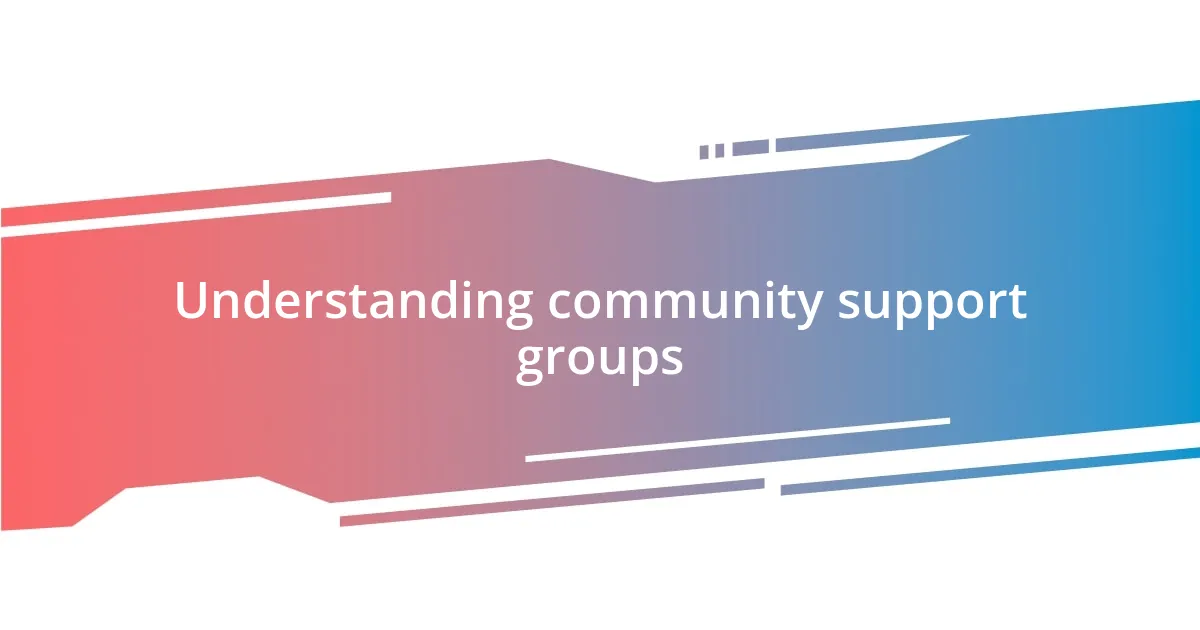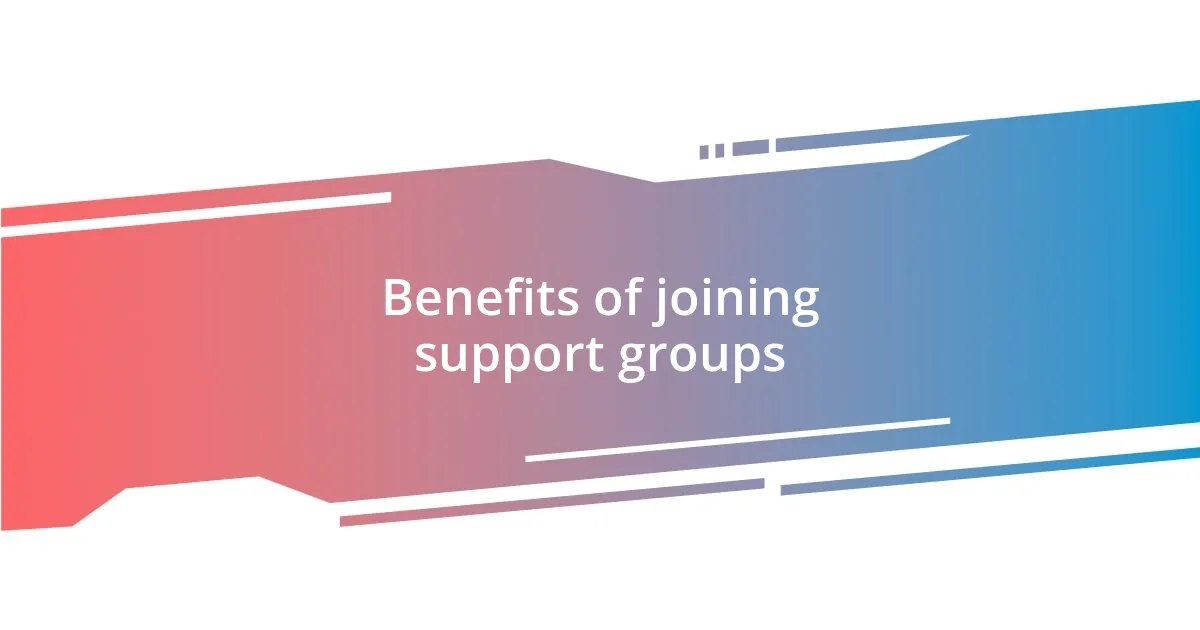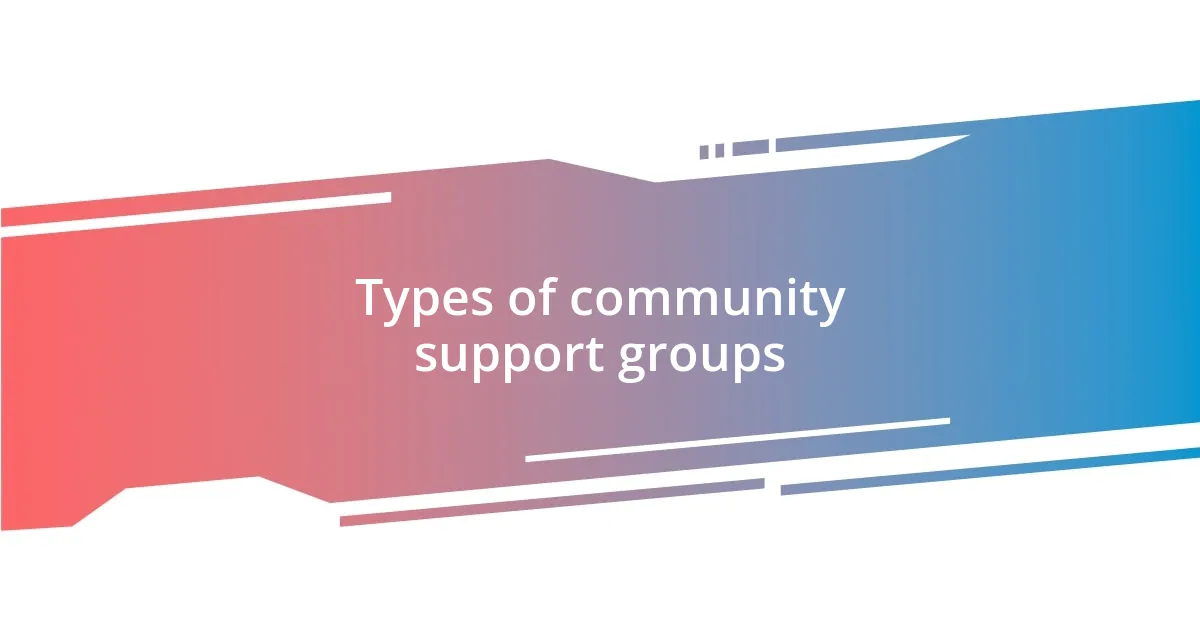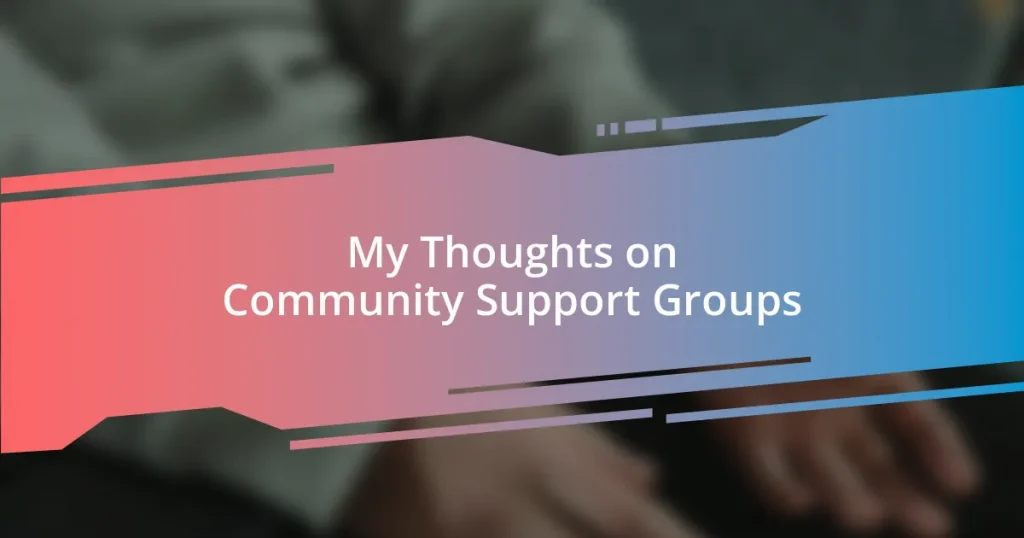Key takeaways:
- Community support groups provide a safe space for individuals to share vulnerabilities and foster connections with others facing similar challenges.
- Joining support groups can lead to a sense of belonging, reduce feelings of isolation, and offer invaluable resources and coping strategies.
- Different types of support groups cater to specific needs, such as health-related issues, grief, and parenting, creating tailored experiences for members.
- Effective participation involves preparing thoughts, actively listening, and asking questions to deepen understanding and build connections.

Understanding community support groups
Community support groups serve as vital lifelines for individuals facing similar challenges. I remember attending my first group meeting, uncertain about what to expect. The warmth and understanding in that room were palpable; it was a safe space where vulnerabilities were shared without judgment. Isn’t it comforting to know that there are others who truly get what you’re going through?
These groups come in many forms, from mental health support to chronic illness discussions. Each group creates a unique ecosystem of empathy and shared experience. I often think about how powerful it is to hear someone say, “I’ve been there too.” It’s a reminder that we are not alone in our struggles, and sometimes, that connection is all we need to start healing.
At their core, community support groups foster a sense of belonging. They empower individuals to express themselves openly, often leading to transformative insights. Have you ever felt a weight lift simply by talking to someone who understands? Those shared experiences can spark hope and encourage personal growth in ways we might not anticipate initially.

Benefits of joining support groups
Joining a support group can have a profound impact on your emotional well-being. One benefit that stands out to me is the sense of community developed in these settings. It reminds me of the first time I shared my story; the encouraging nods and compassionate glances from others made me feel heard and understood. This connection can significantly reduce feelings of isolation, creating a network of support that’s both comforting and empowering.
Moreover, support groups offer invaluable resources and insights that might not be easily accessible elsewhere. I once attended a group focused on coping strategies for anxiety. Hearing diverse experiences and tools others used gave me fresh perspectives I hadn’t considered. It’s like having a personalized toolbox at your fingertips, tailored to your unique challenges, which can ultimately lead to effective coping mechanisms that you can adapt to your life.
Additionally, participating in a support group can boost your self-confidence and self-awareness. I remember during one session, I unexpectedly received feedback that shifted my viewpoint about my struggles. Knowing that I could impact someone else’s journey through my experiences made me realize how valuable my voice truly is. This mutual exchange not only nurtures confidence but also cultivates a profound understanding of oneself through shared narratives.
| Benefit | Description |
|---|---|
| Sense of Belonging | Provides emotional support and reduces feelings of isolation. |
| Resource Sharing | Offers insights, coping strategies, and diverse perspectives from others. |
| Confidence Boost | Enhances self-awareness and empowers personal narrative through shared experiences. |

Types of community support groups
Support groups can be categorized in several ways, depending on the specific needs of their participants. I’ve found that this variety helps individuals find the right fit for their circumstances. For instance, some groups focus on particular conditions or challenges, while others provide broader community support. This diversity is crucial as it allows for tailored experiences that resonate deeply with members.
Here are some common types of community support groups:
- Health-Related Support Groups: These address specific medical or mental health conditions, providing information and emotional support.
- Grief and Loss Groups: They facilitate healing for those dealing with the death of a loved one, emphasizing shared experiences and coping strategies.
- Caregiver Support: These groups focus on the unique stresses faced by caregivers, offering a safe space to share challenges and gain support from others in similar situations.
- Parenting Groups: They help parents navigate the ups and downs of raising children, often fostering friendships among those facing similar parenting issues.
- Substance Abuse Recovery: Centers on providing encouragement and accountability for individuals recovering from addiction, like Alcoholics Anonymous or Narcotics Anonymous.
I’ve personally witnessed the impact of these specialized groups. For example, when I attended a health-related support group for chronic pain, the stories shared felt like a collective sigh of relief. Hearing someone articulate my own frustrations made me feel seen and validated. It reminded me how vital it is for individuals to connect based on their unique experiences while also recognizing the common threads that unite us all.

Tips for effective participation
To engage effectively in a support group, I recommend coming prepared with your own thoughts and feelings. When I first joined a group, I jotted down a few points to share. This not only helped me articulate my experiences but also made it easier to contribute to discussions. Have you ever felt lost for words when the moment finally arrives? Trust me, having a few key points ready can ease that pressure.
Listening is just as important as sharing. I recall a session where one participant opened up about their struggles, and I found myself hanging on every word. I realized then that actively engaging in others’ stories deepened my understanding—and, honestly, it felt good to be a supportive listener. Isn’t it fascinating how sometimes, simply being there for someone else can provide clarity about your own journey?
Lastly, don’t hesitate to ask questions! When I’ve sought deeper insights during discussions, it often led to revealing conversations that enriched my experience. One time, I asked someone how they managed their anxiety in social situations. The advice they shared became a game-changer for me. It makes you wonder, doesn’t it? How much can we learn from each other if we’re just willing to ask?

Sharing your experiences in groups
Sharing experiences in a support group can be transformative for both the speaker and the listeners. When I opened up about my struggles with anxiety in one session, I was surprised by how others leaned in, eager to connect with my story. It was as if my vulnerability created a bridge, allowing us all to share our truths more openly. Have you ever experienced that moment when you say something and feel the group’s collective sigh of understanding? It’s a beautiful reminder of our shared humanity.
In another instance, I listened to a member recount their story of loss, describing the poignant memories that lingered even years later. I felt the weight of their sorrow and joy intermingling, which reminded me of my own experiences with grief. These shared narratives create a tapestry of support that weaves us together, validating our feelings in ways we often don’t get in everyday life. Isn’t it incredible how shared stories can make our paths feel less solitary?
What I’ve learned is that the act of sharing can be cathartic. I remember a time when I hesitated to talk about my past struggles with self-esteem. But once I did, I felt an enormous release, as if I had been carrying a heavy backpack all along. It’s in those moments of openness that bonds form, and we often discover that we’re not alone in our thoughts. Listening to others reaffirms that we’re all navigating our unique journeys, but together, we can lighten the load.















